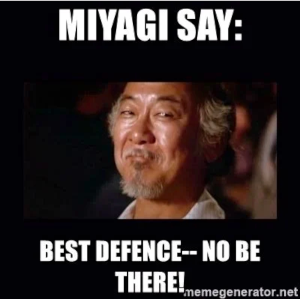Karate is like gambling
Sometimes you just get beat.
As a beginner in the martial arts, it seems like everyone is better than you, so it’s only natural that more advanced students will get the better of you. Many students expect this dynamic to change over time. As their skills improve, they expect to be able to hold their own own with more of their peers. Generally, that’s true, but not always and it’s never a sure thing. Ask anyone who’s been training for a while and they’ll tell you that white belts are some of the most dangerous people in class. They’re unpredictable, and sometimes they come to class with skills you don’t know about. 🤷
And therein lies the lesson: No matter how long you’ve trained, or how “good” you are, sometimes circumstances conspire to leave you at a disadvantage from which you can’t recover.

Some students are frustrated by this. After all, if karate can’t keep them safe, why train at all? (For those asking this question, I encourage you to listen to this excellent podcast by Iain Abernethy.)
From a self-defense perspective, martial arts training isn’t supposed to make you invincible (and anyone who says otherwise is selling something). It’s designed to give you a better chance than you otherwise would have had without it. The more you train, the better your chances, but self-defense is never a sure thing.
Martial arts is not unique in this regard. Professional athletes train all day, every day, and they still get beat. Sometimes you just get dealt a bad hand. In that respect, self-defense is a bit like gambling.
Most people are probably familiar with Blackjack, the card game where you try to get cards totalling as close to 21 as possible without going over. It’s so well known that Casinos allow you to puchase little cheat sheets and use them while playing. Why? Because even if you play “perfectly” the house still has an advantage. Play long enough, and you’re going to lose.
Self-defense is the same way. If you put yourself in dangerous situations often enough, you’ll eventually need to defend yourself, and if you let someone throw enough punches, they’re eventually going to land one. That’s why we learn to attack as part of “self-defense.” It’s not because we want to hurt people, it’s because we can’t allow the attacker to continue attacking indefinitely.
Here’s where it gets interesting … if you look at several Blackjack cheat sheets online, you’ll start to notice slight differences. One strategy might have you stand on a soft 14 against a dealer’s 4 while another suggests you double down, etc. Is one right and the other wrong? Maybe … but if so the difference is probably very, very small. Just consider these to be different styles of play. Likewise, different “styles” of martial arts teach us to handle similar situations in different ways. Is one better than another? Maybe, but most likely not by much.
The point here isn’t that one cheat sheet is better than another. It’s that having a plan is better than not having a plan, and if you play long enough, you won’t even need to look at the sheet anymore. Martial arts is the same way. It’s not that one style is better than another. It’s that practicing any method of reacting to an attack is better than “winging it” in the moment. Practice it long enough, and you don’t even have to think about it anymore.
There is one more similarity between gambling and self-defense: The best way to avoid “losing” is to avoid the situation in the first place. If you don’t want to lose money at the casino, don’t go there. If you don’t want to encounter violence, don’t frequent places where violence is more likely to happen.
